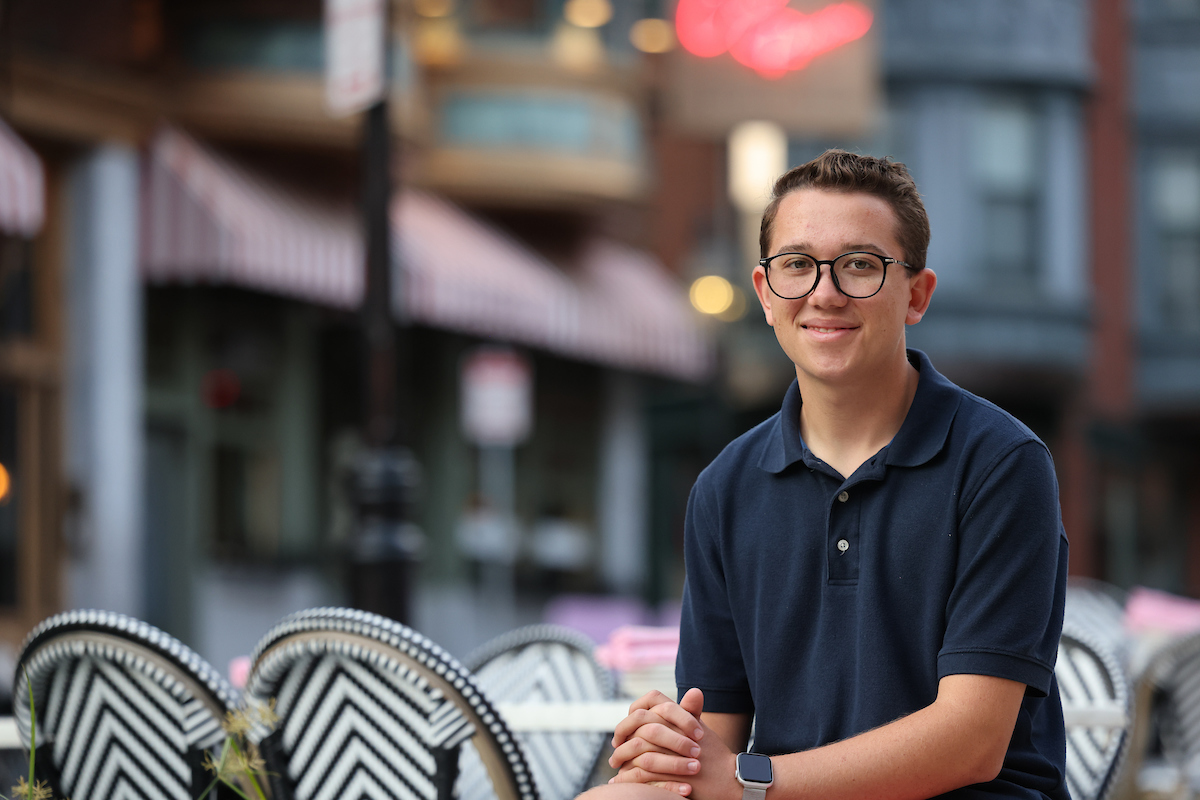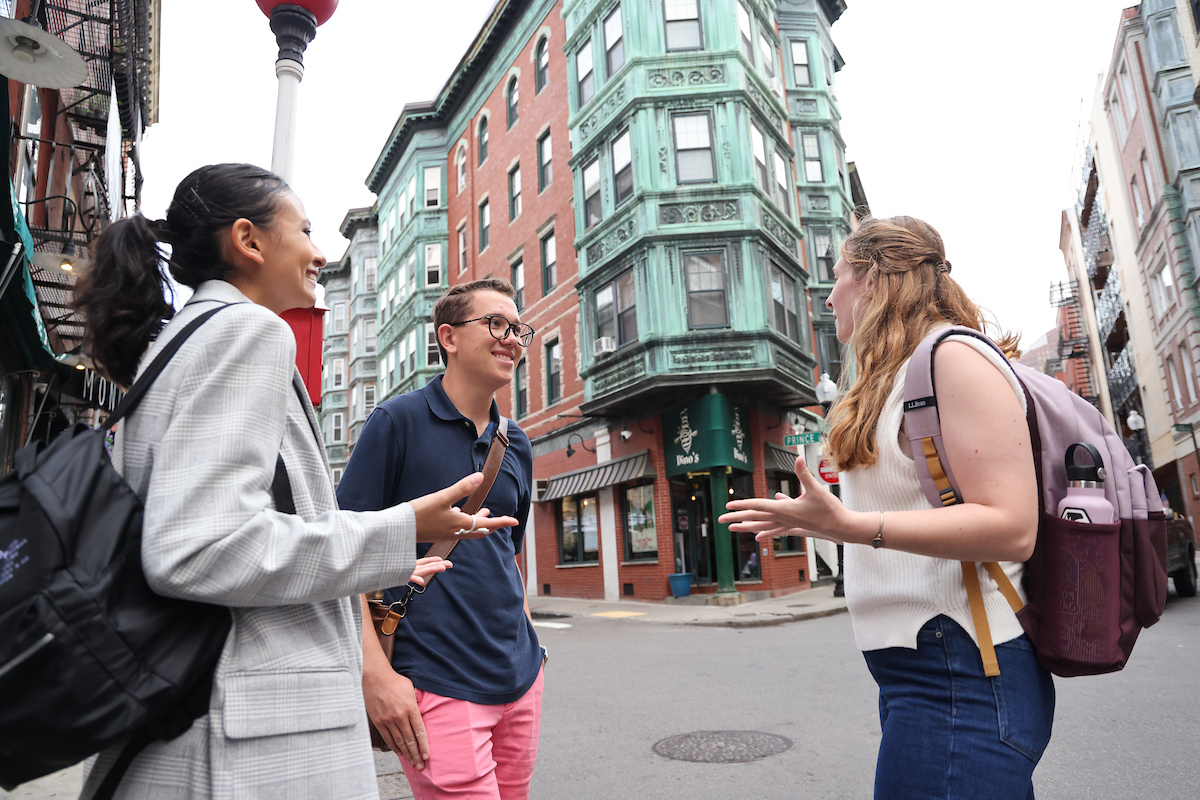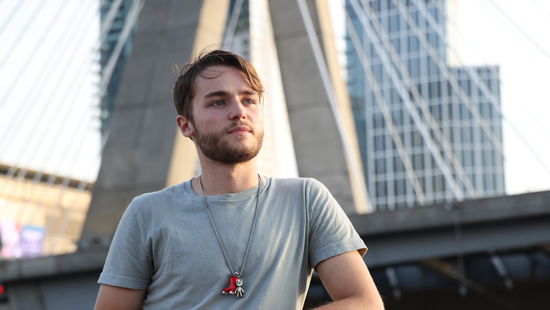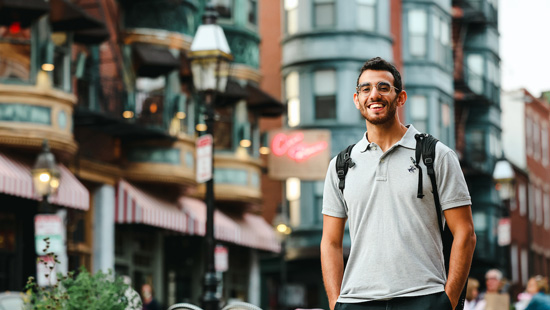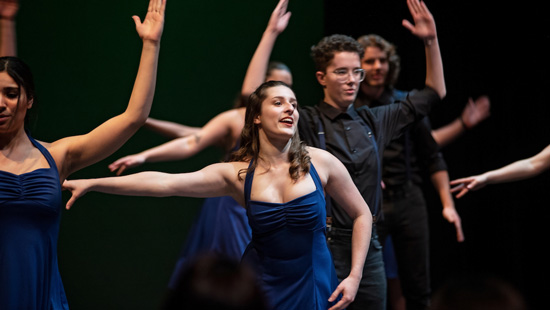Providing the Best Experience
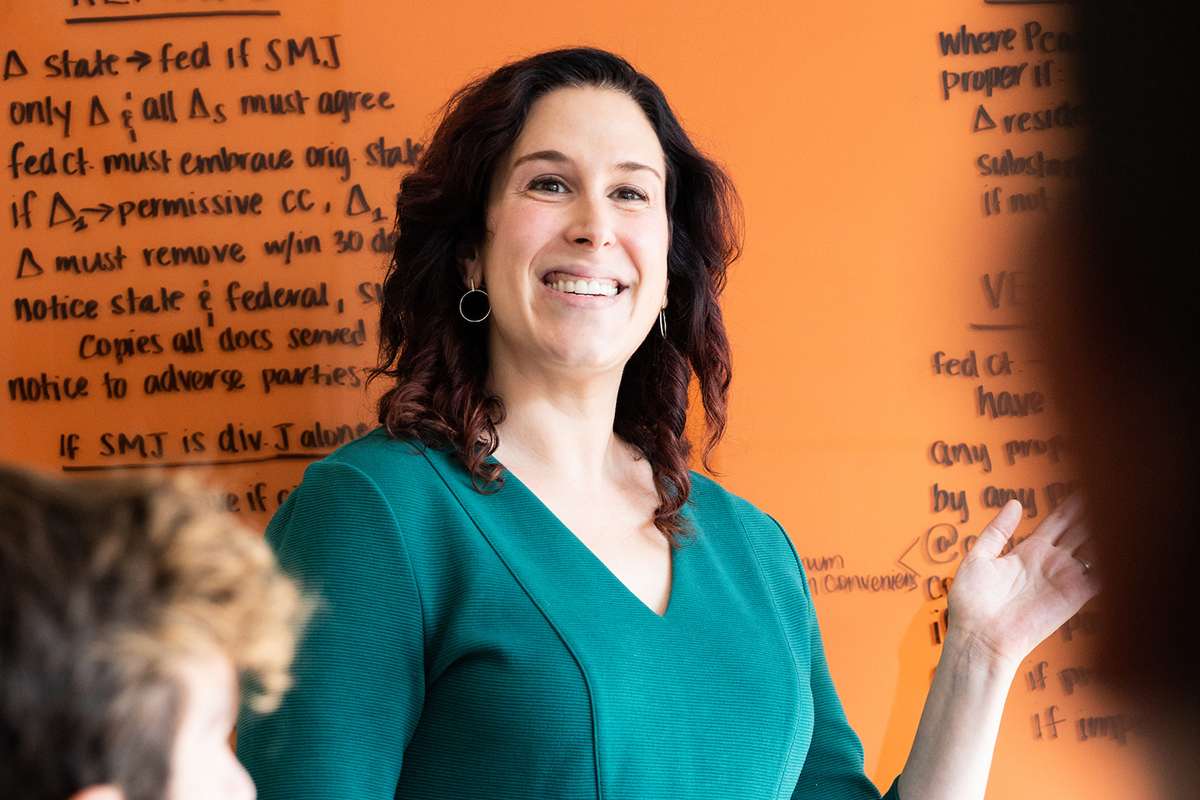
Of course, the ability to focus your attention is more than a weeklong challenge. It’s an essential aspect of being a successful college student. And that concept of preparing Suffolk’s newest Rams enriches every first-year seminar, regardless of the course name and the instructor’s academic field.
The hook? Intellectual curiosity and sheer excitement—both of which positively radiate from Associate Professor of English Amy Monticello, who directs the FYS Program.
“What is the best experience you have at college?” she asks. “It’s the small room where everyone is super into the topic, the work of that class. And you’re doing a deep dive into something cool that everybody has decided they want to study. It’s a self-selected thing.”
What students learn in these seminars sets the stage for the three years that follow. “You can see students’ entire trajectories in some cases,” Monticello notes, “which is one of the joys and enormous privileges of teaching first-year students.”
Her seminar, In the First Person: 21st-Century Storytelling, attracts students looking to polish their narrative skills. Monticello encourages her students to experiment with diverse media—including podcasts and Google Maps—to tell stories in fresh ways. Week by week, she helps them get their bearings in the course content—and college in general.
Planning for Life
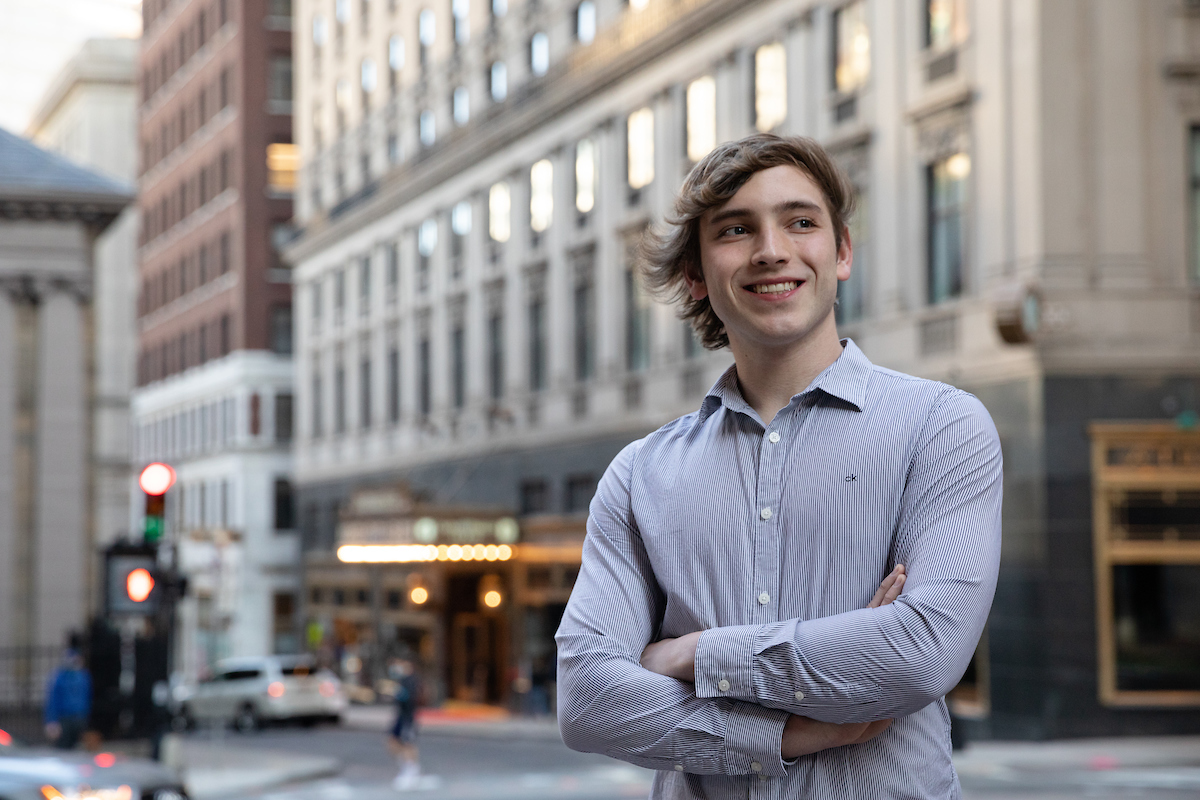
Monticello’s seminar caught Nico Miele’s eye. While this Class of 2024 psychology major was excited to improve his abilities to think critically and evaluate readings, he didn’t expect all the life hacks he gained in class.
For Nico, his seminar was his introduction to stories that break free from the written word. After listening to podcasts, he recorded his own oral narrative. He also learned to decode a visual narrative, following the flow of photographs to watch a story unfold.
“The class helped me branch out and try something I was unsure about,” he says. “I was nervous about both of them because I’d never done anything like it, but they were both great.”
Thanks to a reflection paper on time management, Nico’s learning how to organize his time at Suffolk better, too. For a week, he recorded how he spent his hours on everything—naps, video games, chatting with his roommates and teammates, and waiting until 3 a.m. to sleep.
“It’s stuff that’s just nature to you,” he admits, “but once you’re looking at it and building a reflection off of it, it helped me with stuff that I could work on.”
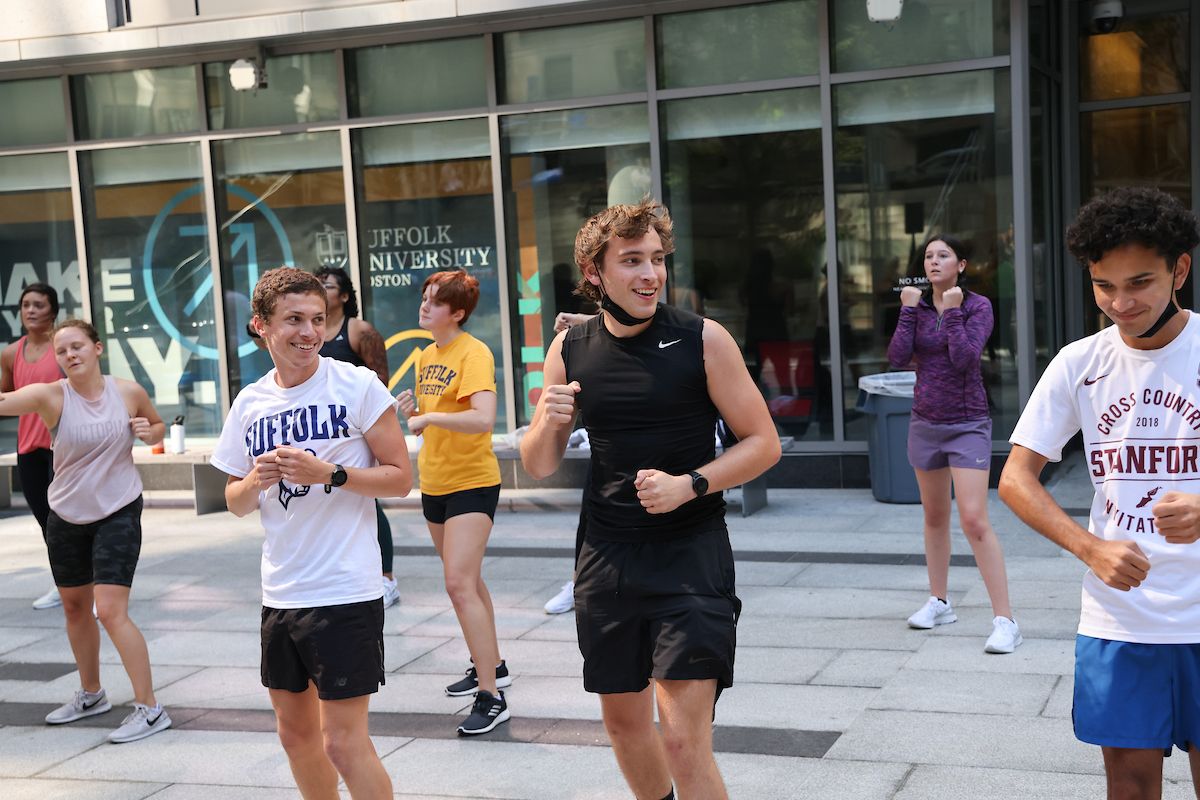
So, what can he work on? “Obviously it’s not going to happen immediately, but it’s something to help me slowly move my way into going to bed earlier, maybe cutting out the naps, more homework time. If I’m playing three hours of Xbox, do like 30 minutes and work on job applications.”
Perhaps most importantly, it’s demystified the concept of being a Suffolk student and given him a sense of connection to the University at large.
“Professor Monticello is one of the best teachers I’ve ever had throughout my education,” Nico says. “She made us feel comfortable. She wasn’t a professor talking down to students below her. There was a connection between us and her—like normal people talking.”
And by sharing her insights on which campus resources to visit when, she showed Nico and his classmates how to get the most out of their first semester and every semester after. “Professor Monticello is so nice and wants all of her students to succeed. She is going to make it possible for you to succeed, as long as you put the work in.”
His first-year seminar’s made quite the impression. “It’s going to help not only now, but for the rest of my life,” he says.
Chasing Her Professional Dream
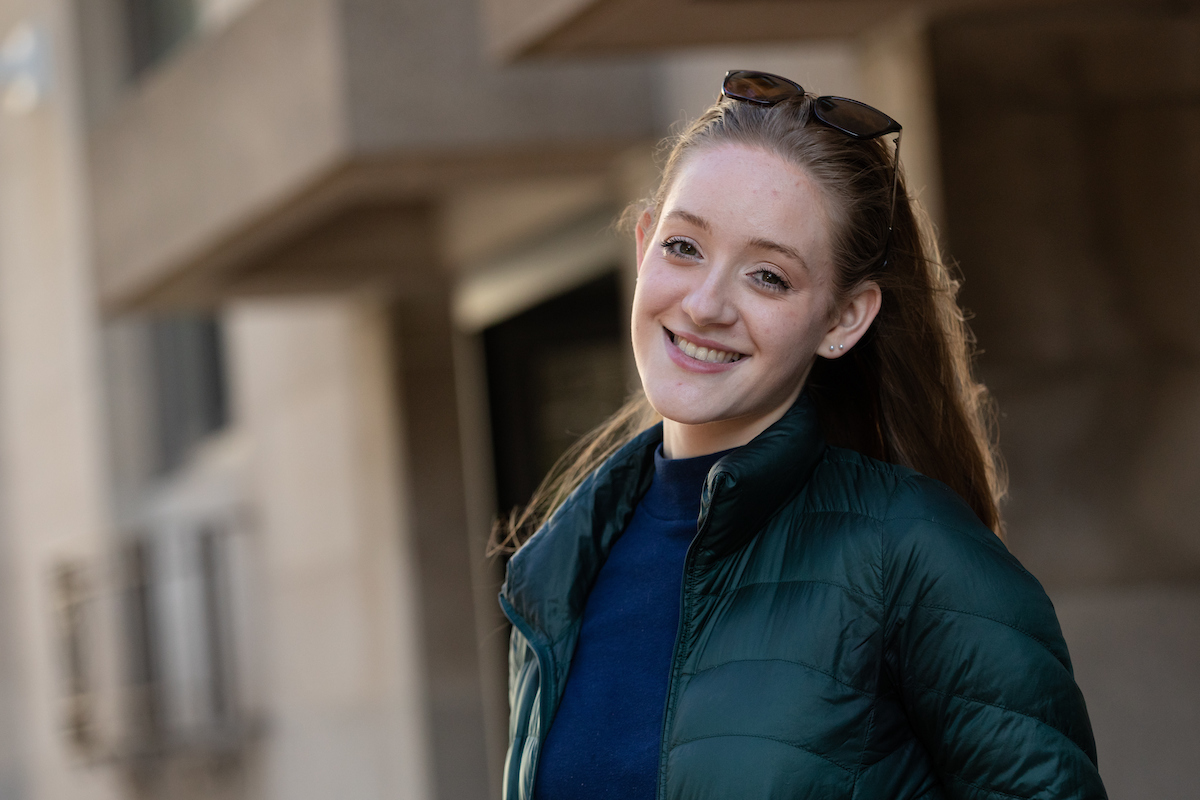
Christine Sloss knows what she wants out of life.
She’s known since her childhood in Marblehead, Massachusetts, when her parents borrowed free passes from the local library to whisk her to the exotic worlds contained in the Peabody Essex Museum, Museum of Fine Arts, and Isabella Stewart Gardner Museum. Her AP Art History class in high school further illuminated her ideal career path.
“The dream is to one day run the charitable foundation associated with a museum,” she says, “to make museums more accessible to the public and equitable.”
Christine, Class of 2023, found just the right class to indulge her academic passion and really connect with Suffolk. Curators, Collections & Exhibits, a first-year seminar taught by Associate Professor of Biology Eric Dewar, practically leaped out of the course catalog at her.
“Going into college, I think people are nervous that all your classes are going to be 10-page papers due every night with annotated bibliographies,” she says. “This class was a really fun way to start my college career. We went to see all these crazy, amazing museums all around Boston with a professor who made it a great class that was really engaging.”
And on the rare day that the class wasn’t exploring the collections at the Boston Athenaeum, African Meeting House, Harrison Gray Otis House, and other institutions, Christine and her classmates unwound with a spin on the Rose Kennedy Greenway’s carousel.
For her final class assignment, Christine curated an exhibit on dorm plants—specifically, the role her fellow plant-owners play as city dwellers cultivating a new age of environmentalism in their residence hall rooms. She then presented her project at Suffolk’s honors symposium.
Planting the Seeds of Academic Success
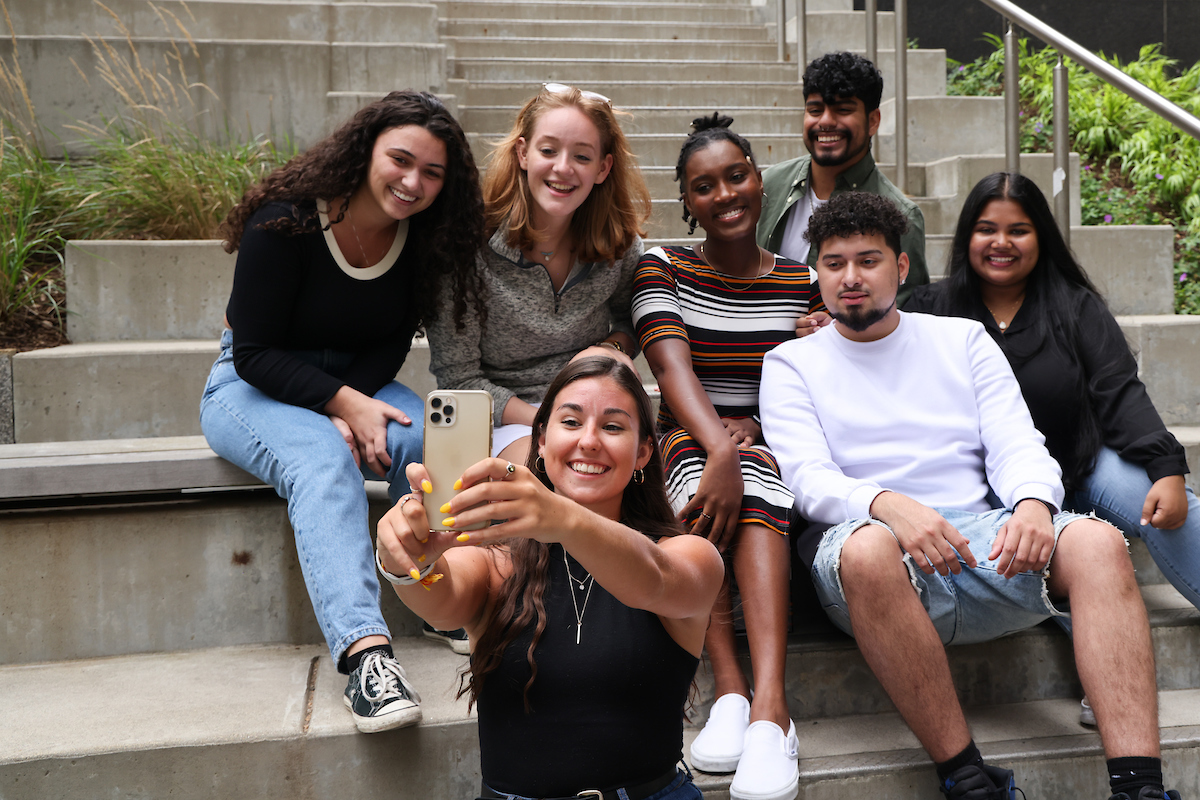
A lot has changed since Christine’s first semester. After starting off in the College of Arts & Sciences as a political science major, she’s now studying business administration in the Sawyer Business School, with a nonprofit administration minor and a paralegal studies certificate to boot.
But her ambition to work in museums still burns bright. Her dorm plants—a fiddle-leaf fig, two jade plants, and a fast-growing beanstalk (species unknown)—continue to flourish, as does her strong bond with her faculty mentor.
“I got to meet my professor as a person who was also excited about this topic,” she says. “Take the classes that you are passionate about and tell your professor you’re passionate about them. I think that was the best thing I did literally after my first class with Professor Dewar.”
Innovators Welcome
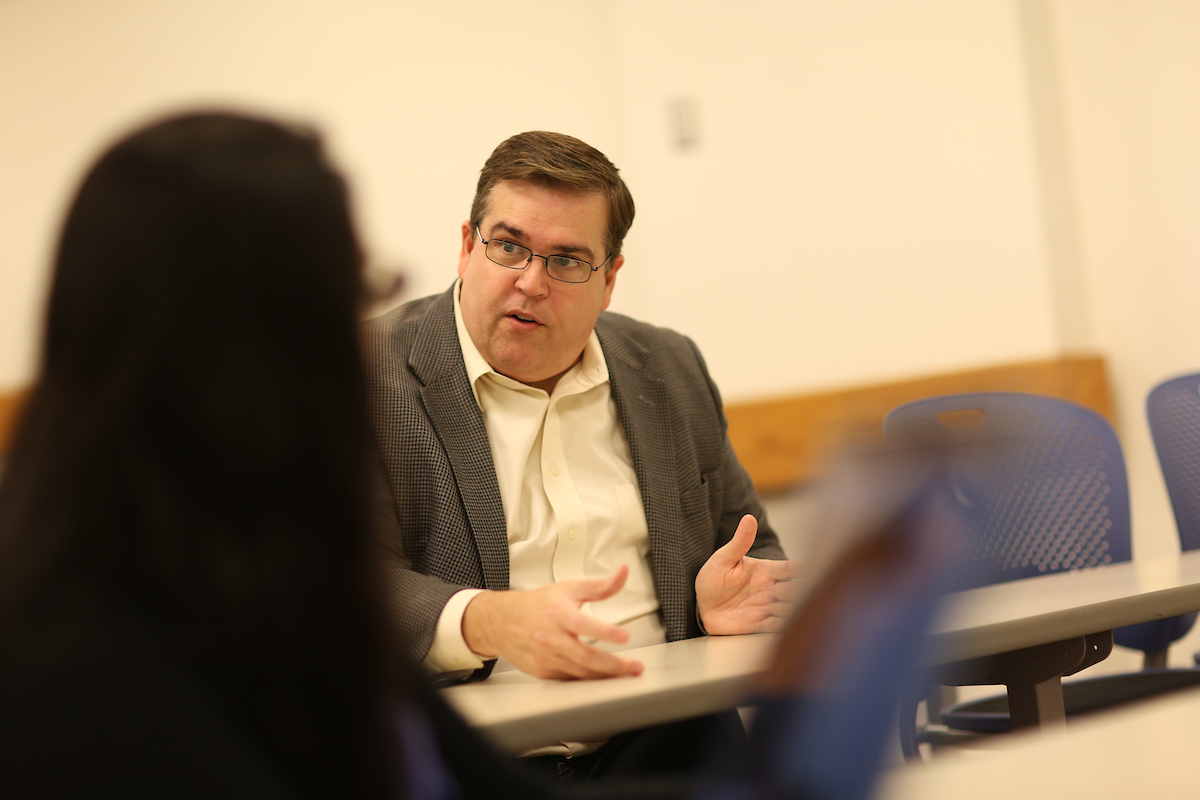
While the First-Year Seminar is required for all College of Arts & Sciences students, new students in both the Sawyer Business School and the College must take a Creativity & Innovation (CI) course. Like FYS courses, these CI classes are not your average lectures—and that’s very much by design.
“We need to use new techniques in problem-solving to really deal with a lot of global problems,” says George Moker, whose many University titles include co-chair of the Creativity & Innovation Steering Committee. “It’s no longer about old-fashioned strategy. It’s no longer about old ways of thinking. It’s about taking the creative approach and using that to find unique and useful solutions.”
Think creativity is just for artists? Think again. “Creativity is across all thought processes,” Moker notes, and Suffolk’s academic catalog backs him up.
Incoming Rams have their pick of CI courses ranging from Think Small: Change the World, Chemistry Is Everywhere, and the Entrepreneur’s Cocktail to Inventing for Non-Engineers, The End of Global Poverty, and Solutions for Sustainability (the last two of which Moker teaches). There are dozens more.
No matter which class they choose, students tackle big-picture themes in teams, collaborating with their peers across the University on out-of-the-box projects. “The more unique, the more useful—the better you do on a grade, which is done through polling,” Moker says. “It’s not about the grade; it’s about being creative.”
It’s also about being okay with the occasional failure—a concept baked into the creative process. Every CI course encourages students to adapt and revise their projects and thinking on the way to truly new insights.
“There are going to be 2–4 million people graduating the same month as you,” Moker tells his students. “What’s going to make you stand out of that crowd? That’s going to be your ability to solve problems.”
Finding Her Excitement
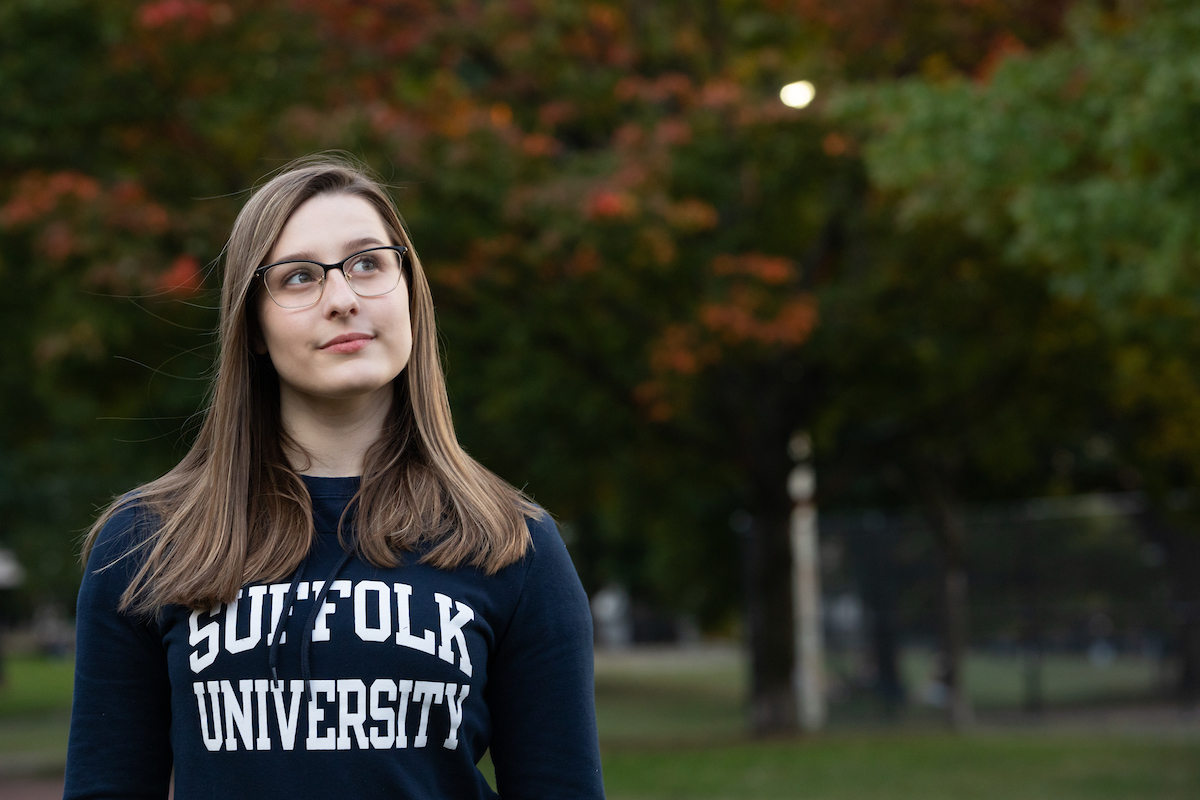
Morgan Mitcheson knew she had a problem the first semester of her first year: the academic major she’d declared as a brand-new Ram.
“It was interesting, but it wasn’t crazy interesting,” she says. “I learned a lot, but it just didn’t feel right for me.”
Her CI course—Dreams, Demons & Dynamic Artists’ Creative Nature—was another story. “I was ridiculously excited for it,” Morgan, Class of 2023, says, “even though it was at 10 a.m. on Fridays and two hours and 40 minutes long.”
Taught by psychology instructor Nichole Vatcher, the course explores dream theories, mental illnesses, the works of artists like Vincent van Gogh and Yayoi Kusama, and how different factors affect and influence art and individuals. The goal is to help students activate their own creative nature and see their world in new ways.
“We never did one essay in that course,” Morgan says. Instead, she kept a dream journal, created a mock ‘failure resume’ and gave a presentation on what she learned from it, and visited Boston’s Institute of Contemporary Art to step into Kusama’s mesmerizing infinity mirror rooms.
For their final project, she and her groupmates produced an animated newscast on multi-level marketing campaigns (think Mary Kay and those shakes that promise to melt body fat) and how they influence individuals.
Meant to Be
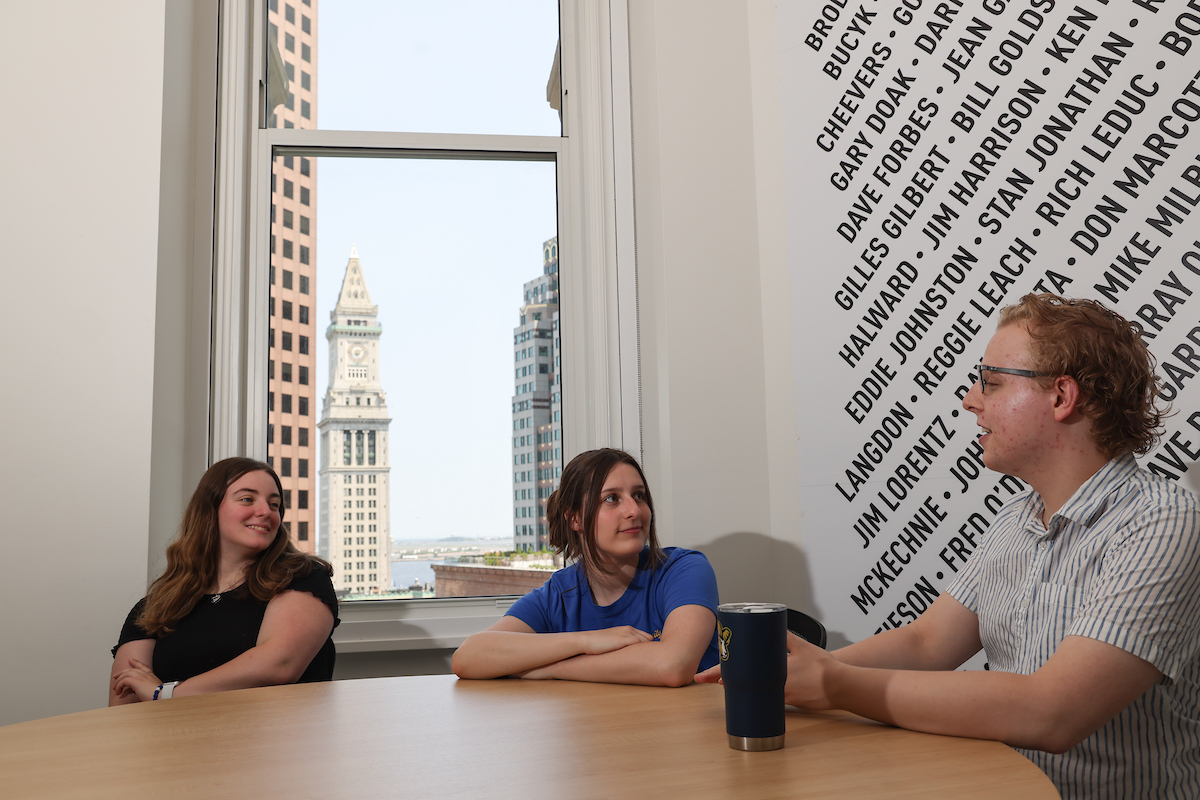
Morgan’s psychology-based CI course inspired a major breakthrough. “This is what I’m interested in,” she remembers realizing. “This is where I’m meant to be.”
Her next thought was, “Okay, maybe I need to take more classes similar to this.” One trip to the Undergraduate Academic Advising Center later, Morgan was officially a psychology major.
Still, veering off her original academic path felt like a personal failure. “Perfectionism brain going on,” she explains. “But switching majors showed me it’s okay not to pick the right thing initially.”
Actually, it’s more than okay—it’s normal, as Morgan can tell you now.
These days, you’ll find her conducting research in Suffolk’s CHOICES Youth Psychopathology and Treatment Lab, an opportunity that’s preparing her for graduate school and achieving her goal of becoming a clinical psychologist.
She might also look familiar, since she’s an Orientation Team Leader, welcoming new Suffolk students and helping them find what excites them on campus and in Boston.
It’s a position Morgan loves—and one that she secured thanks to her CI professor’s glowing recommendation letter.
Freedom of Thought
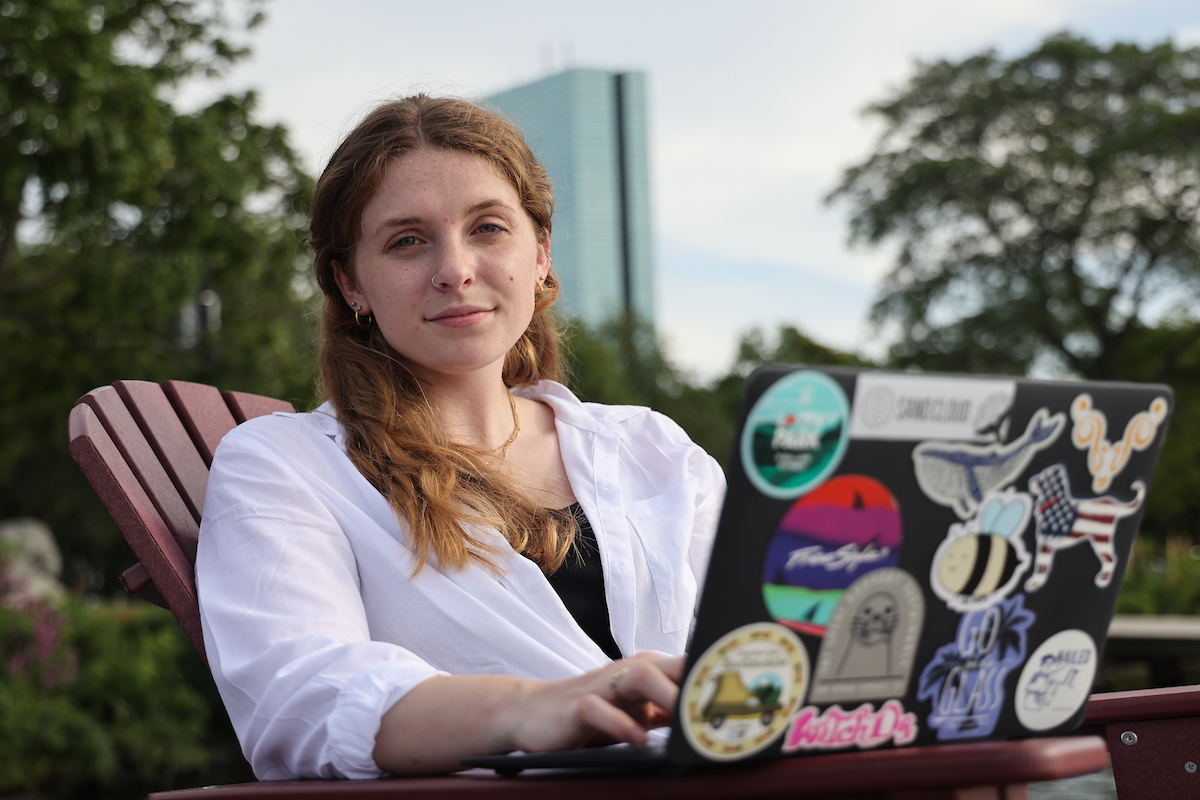
“This one sounds cool,” thought Chloe Beaulieu, when she came across Solutions for Sustainability the summer before her first year. “I didn’t really know exactly what it was going to be about going into it, but it seemed like a topic I’d be interested in.”
With the assigned text Thinkertoys: A Handbook of Creative-Thinking Techniques at her side, she soon found out what CI is all about. Moker challenged Chloe’s class to consider the problem of waste on campus—particularly the use of nonbiodegradable plastics—and formulate a new, practical way to address it. Drawing on a word-association web for inspiration, Chloe, Class of 2023, and her group championed the concept of a cup that could be reused a certain number of times before its owner gets a free coffee on campus.
“We all put our heads together and pulled everyone’s different backgrounds and ideas into the solution,” Chloe says. “Maybe not everyone in the group originally thought that was going to be our solution, but we connected on it.”
But whatever they came up with, Chloe felt empowered by Moker to try and try again. “He didn’t make it like, ‘You have to be creative in this way or that way,’” she says. “There wasn’t really that fear of, ‘Oh no! I’m taking this really interesting class about creativity, but I don’t know how to be creative. I’m going to fail.’
“You weren’t concerned about failing,” she continues; “you were more focused on ‘How can I just do my best to push myself and work with my group to create a good solution?’”
Discovering Her Leadership Style
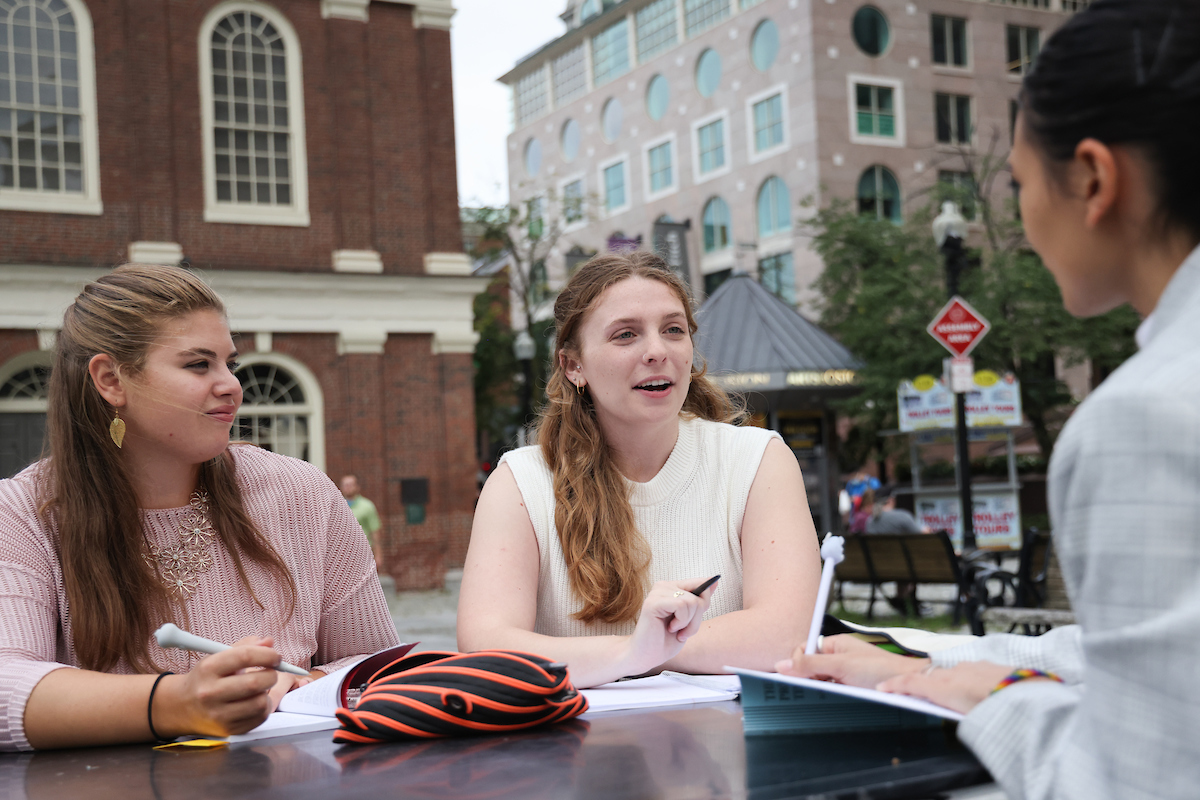
CI courses immerse students in group projects, sparking academic collaborations as well as new insights on the personal level.
Chloe learned a lot from all that teamwork—not just about sustainability, but about herself. “You learn listening, and you learn leadership,” she says, “and you have to use those skills hand-in-hand to have a really successful experience in your classes and with your peers.” She also points out that your groupmates might show up in your future classes—and even your future workplace—so it’s wise to learn how to work effectively with them.
“I’m more of a participatory leader,” Chloe says of her own leadership style. “I like to be part of the action and have everyone working together, which can be difficult, but that collaboration is important to me.”
The Foundation for Future Success
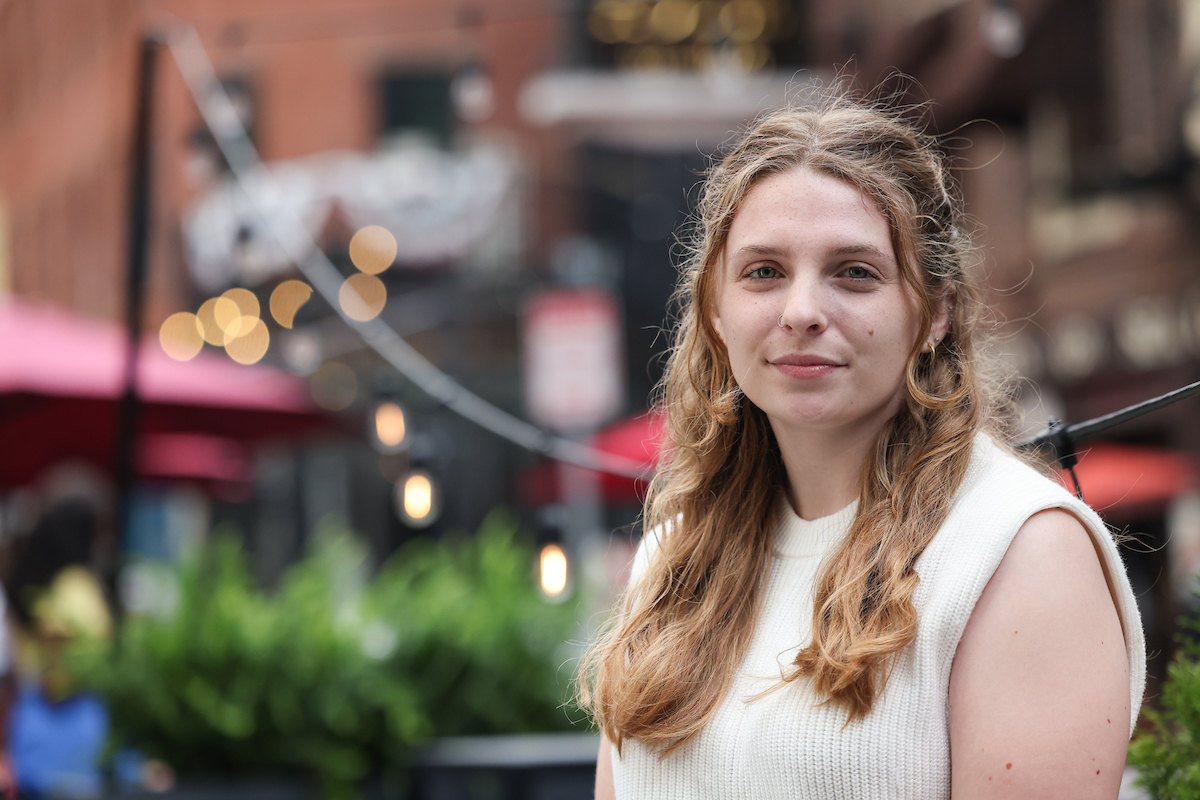
Chloe also gained key takeaways from the one-credit courses all first-year Business School students are required to take: SBS 100 careerSTART and SBS 200 careerEXPLORE, along with presentation-focused SBS 101 Business Foundations, and an intro to marketing.
“They’re some of the most important classes I’ve taken at Suffolk,” she says, “because you start building yourself as a professional. They teach you how to showcase yourself, apply your knowledge, and network yourself to employers. Making my LinkedIn profile in SBS 100—that was super-important! Now I go on LinkedIn every day and find internships.”
A marketing major with a minor in product innovation and brand marketing, Chloe’s already completed an internship doing marketing and public relations for Art Resource Collaborative for Kids (ARCK Boston).
“Boston has a lot of great opportunities, and I keep looking for those,” she says. “I want to work for a firm where I can work as part of a team, creating really meaningful promotions.”
Now, ad agency Hill Holliday is on Chloe’s internship wish list. And given her strong business foundation, she’s well-prepared to get her wish.
A Matter of Facts

Even if you think you know all the answers, there’s always room for new possibilities. That’s why the first-year experience at Suffolk is specifically designed to let you take new directions, explore surprising opportunities, and see where your interests take you.
Just ask Grace Laverriere, who questions everything. She has to, if she wants to lead her dream career in broadcast journalism.
When she saw a first-year seminar called What is a Fact? she knew she had to take it. It quickly cleared up any questions she had about academics at Suffolk.
“I can’t say enough about Nicholas Frangipane,” Grace, Class of 2023, says. “I was very nervous going in because I wasn’t sure if the seminar was going to be very much lecture-based. But it was the students and professor working together. The collaboration was really nice, and there were a lot of discussions.”
Grace found the course so inspiring, she added another fact to her academic transcript: a minor in English.
She found even more inspiration in another first-year requirement.
Flipping the Narrative
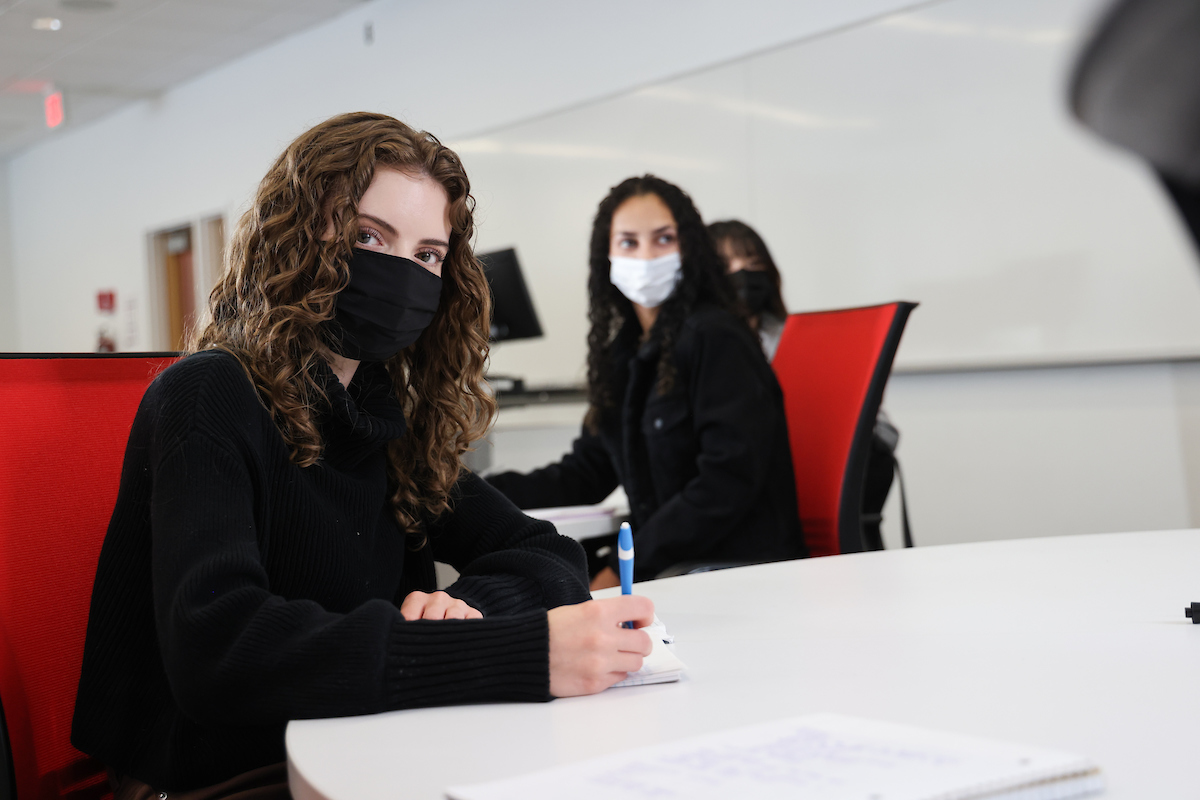
Just as every Sawyer Business School student takes Business Foundations, their College of Arts & Sciences peers must take Strategies for Success, commonly known as CAS 101.
Grace didn’t just pass this course. She excelled at it.
“It was honestly so much fun,” she says. “It was a lot of presentations and speeches—not just about our major, but also impromptu speeches so we could get some practice speaking on our feet and just keeping the three minutes full of information,” she says.
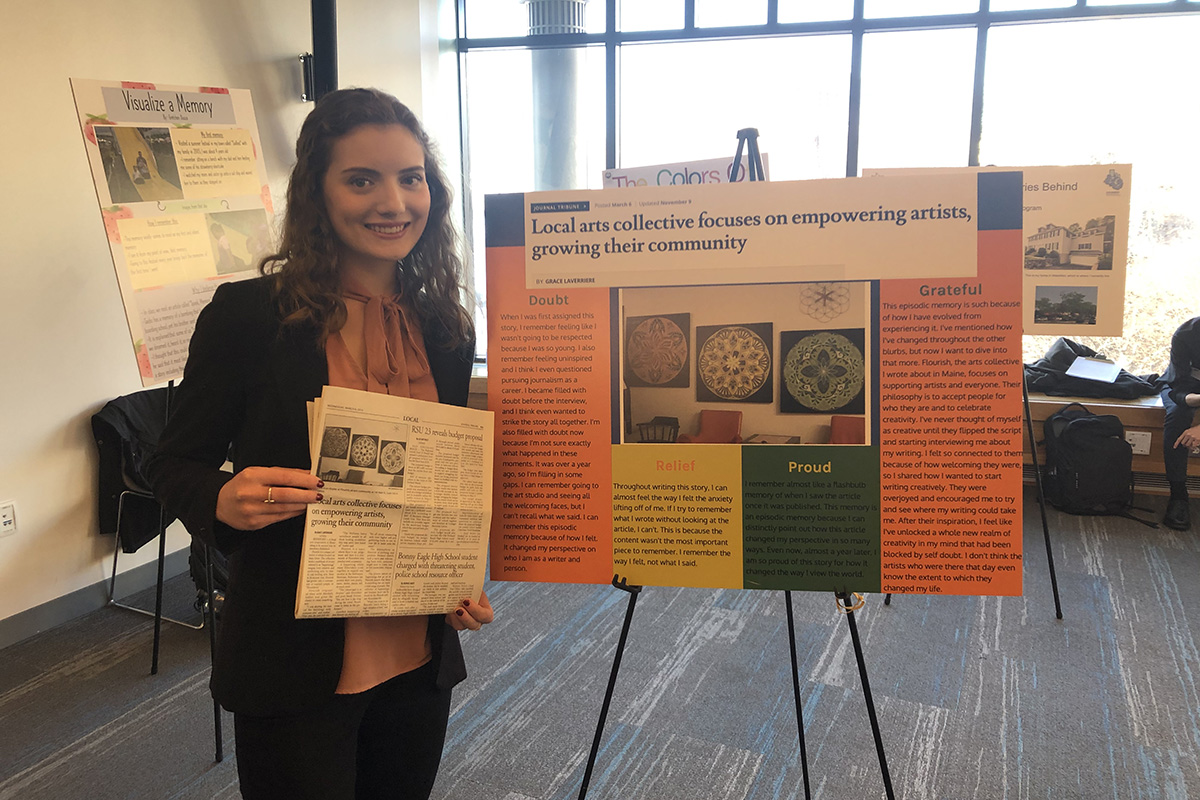
Her poise caught the attention of a teaching assistant, who encouraged Grace to apply to become a CAS 101 TA herself for fall 2020. With a recommendation from Frangipane, she landed the position.
“I was a little self-conscious because I was like, ‘I’m only one year older than these people,’ she says. "‘So will they see me as a peer or as a mentor?’”
Grace’s nervousness soon disappeared, and she connected on camera with her students via Zoom. It turns out she had a lot to offer them as a mentor and a peer who’d been in their shoes just a year before. When she had the chance to lead the class, Grace organized a student involvement panel, and invited her friends to present to her first-year students about their campus organizations.
Through this leadership role, she gained even greater confidence in her own speaking skills and on-camera presence.
“I had to articulate things that they had to learn in a way that they would understand,” she says. “It couldn’t just be me rambling for 30 minutes. It had to actually be something that they could understand and take notes on or ask questions about. I learned a lot about myself.”
New Horizons
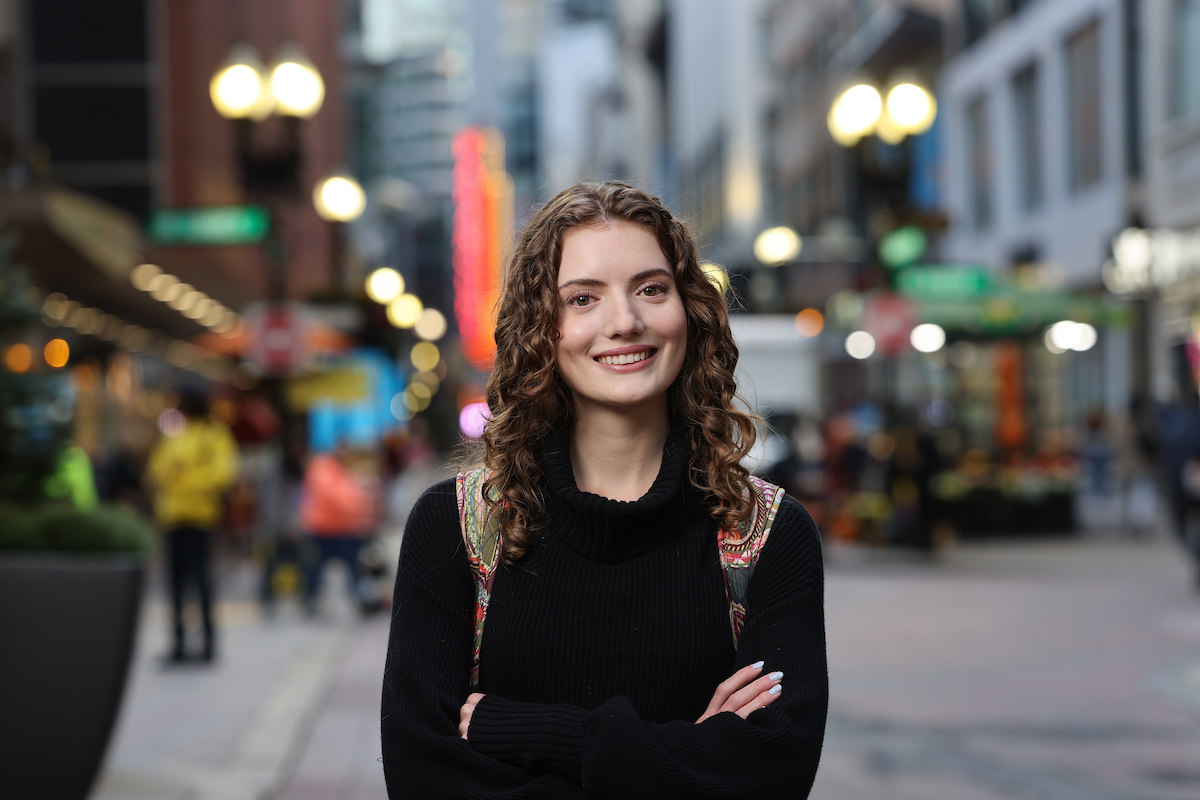
Grace still cherishes her dream of being a journalist, but now she can imagine a new future for herself as an educator in her own classroom.
The fact is, thanks to her Suffolk career so far, she’s more than ready to ponder multiple career paths and define success on her own terms. And that’s what the first-year experience here is all about.
